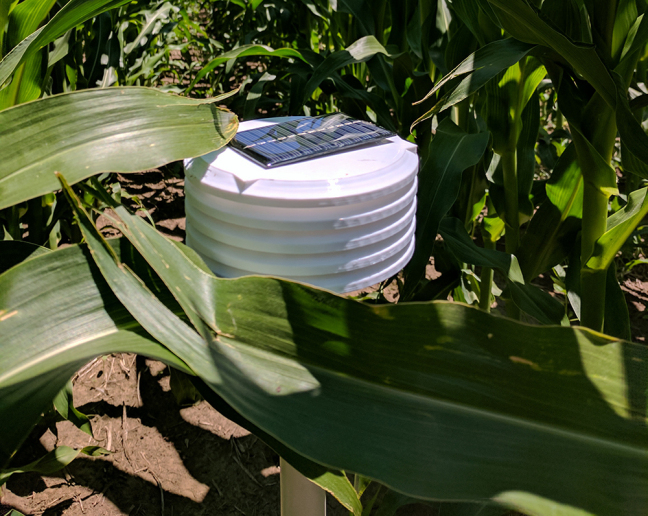
Researchers from Iowa State and Iowa are working together to collect data from farm fields -- soil moisture, temperature, humidity and the like -- as part of a joint project to improve weather forecasts for precision agriculture. The data-collection device shown here was designed and built at Protostudios, a prototype-development facility at Iowa. Larger photo. Photo by Spencer Kuhl, Protostudios, the University of Iowa.
AMES, Iowa – Researchers from Iowa State University and the University of Iowa are building joint teams that will work to use gut bacteria to treat chronic diseases, improve weather forecasts for precision agriculture and produce better vaccines against swine and avian flu.
The three teams have each won two-year, $50,000 seed grants to help them develop their bioscience projects. This is the second year of the program supported by the offices of the Vice President for Research at Iowa State and Iowa.
The idea is to help researchers build teams, collect data, grow projects and compete for bigger grants.
This year’s grant program invited proposals related to four platforms identified by Gov. Kim Reynolds and a 2017 economic study as having potential to grow the state’s bioscience economy: vaccines and immunotherapy; precision and digital agriculture; medical devices; and biobased chemicals.
“The biosciences represent a significant growth engine for Iowa’s economy, and research is the fuel that drives this growth,” said Sarah Nusser, Iowa State’s vice president for research. “We’re delighted to partner with the University of Iowa to offer these seed grants for a second consecutive year. This valuable program helps our institutions create an innovation ecosystem to accelerate identifying and translating scientific breakthroughs that ultimately lead to new commercialized bioscience technologies and innovations.”
“We know that the future success of research and scholarship will rely heavily on robust collaborations within and across universities,” said Marty Scholtz, Iowa’s vice president for research. “These grants are an example of the potent impact faculty and universities can have when they work side by side. And it’s a testament to the common vision and passion that the University of Iowa and Iowa State bring to the task of addressing some of the world’s most pressing challenges.”
Here are this year’s winning bioscience projects:
● Treating chronic disease with immunotherapies developed from gut bacteria
Platform: Vaccines and immunotherapy
Researchers: Ashutosh Mangalam, assistant professor of pathology, Iowa; Michael Wannemuehler, professor and chair of veterinary microbiology and preventive medicine, Iowa State
The project: Taking advantage of mice with limited and known kinds of bacteria in their gut, the researchers will introduce specific bacteria to the mice that will become part of the bacterial ecology of the gut. This will allow the team to study how these bacteria affect the novel mice and systematically identify potential therapies to treat chronic diseases such as multiple sclerosis.
● Improving weather forecasts for precision agriculture
Platform: Precision and digital agriculture
Researchers: Jun Wang, professor of chemical and biochemical engineering and assistant director of the Center for Computer-Aided Design, Iowa; Brian Hornbuckle, professor of agronomy, Iowa State; Dave Bennett, professor and chair of geographical and sustainability sciences, Iowa; Marc Linderman, associate professor of geographical and sustainability sciences, Iowa; Allen Bradley, professor of civil and environmental engineering, Iowa; and Andy Vanloocke, assistant professor of agronomy, Iowa State
The project: Precision agriculture – with all its technology and data – is allowing farmers to maximize yields, improve operating efficiencies and cuts costs. But, unpredictable weather can remove some of that precision. The researchers will develop a prototype engineering system to improve forecasts and their delivery by using various technologies, including artificial intelligence, drones, satellite remote sensing and high-performance computing.
● Better vaccines against swine and avian flu
Platform: Vaccines and immunotherapy
Researchers: Kevin Rice, professor of pharmaceutical sciences and experimental therapeutics, Iowa; and Surya Mallapragada, Anson Marston Distinguished Professor in Engineering in chemical and biological engineering and associate vice president for research, Iowa State
The project: The researchers will use double-stranded messenger RNA that carries genetic code to enhance protein antigens in vaccines. The goal is to boost the protective immune response against swine and avian flu.